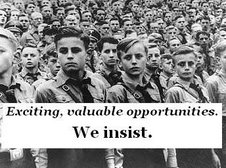Blimey, today's result with Hilary wining in New Hampshire has got the MSM in to a bit of a lather. It seems like they can't cope when the result doesn't reflect "The Polls". Guido sums it up well.How Did We All Get This So Wrong? in the Speccie sums up the pundits this morning. All the pundit talk of double digit leads for Obama have come to naught, there was even talk of Hillary pulling out of the race yesterday.
The beeb, especially Radio 4 this morning, was full of "the American people have voted for.." or The people of New Hampshire have voted for.." it was the same after Iowa. All this shows is that the MSM are completely ignorant of what is going on with the Primaries and how they work, which is different in just about every State.
But before looking at the result its worth understanding the general purpose of the Primary. The idea is for the Party to select its best candidate to fight the election, in this case the US presidential election. Furthermore, as a federal country each State has a proportion of the final say, with the larger States having the largest say, as you would expect. As part of the process the candidates put themselves up for scrutiny by the party faithful (well in most cases but bare with me). This exposes them to the type of scrutiny they will get in the main election and in theory knocks out the weakest candidates, leaving their strongest candidate.
How each state carries out its Primary, and when, is up to that State and there are many ways it can be done, but from here I have listed the main ones:
Closed. Voters may vote in a party's primary only if they are registered members of that party. Independents cannot participate. Note that due to the appropriation of the term "independent" by some political parties, the term "non-partisan" is often used to refer to those who are not affiliated with a political party.
Semi-closed. As in closed primaries, registered party members can vote only in their own party's primary. Semi-closed systems, however, allow unaffiliated voters to participate as well. Depending on the state, independents either make their choice of party primary privately, inside the voting booth, or publicly, by registering with any party on Election Day.
Open. A registered voter may vote in any party primary regardless of his or her own party affiliation. When voters do not pre-register with a party before the primary, it is called a pick-a-party primary because the voter can select which party's primary he or she wishes to vote in on election day. Because of the open nature of this system, a practice known as "raiding" may occur. "Raiding" consists of voters of one party crossing over and voting in the primary of another party. Although no cases can be shown where this has happened successfully, the theory is that opposing party members vote for the weakest candidate of the opposite party in order to give their own party the advantage in the general election.
Semi-open. All voters may vote in any single primary, but must publicly declare which primary they will vote in before entering the voting booth. Typically this declaration is accomplished by requesting a ballot. In many states with semi-open primaries, election officials record each voter's choice of party and provide the parties access to the information
There is one other piece of information you need to understand before we look at the first two results and that is a Caucus which was used in Iowa:
Caucus A caucus is most generally defined as a meeting of supporters or members of a political party or movement. The exact definition varies among many different countries.
So now lets look at the results so far and see why the MSM and polls can be so wrong.
Iowa is a Caucus, which means people had to turn out to public meetings and cast their vote by standing around with other like minded people. It should also be remembered that the weather wasn't exactly temperate either so only the most dedicated will turn out. So who turns out to these meeting do you think? The party faithful, of course. What's more, whilst these may be organised by the State they people mill around so are open to the persuasion by the most vocal and to peer pressure.
So how do we think this type of vote may pan out? My guess is that it tends to favour those closest to the opinions of the core party members and workers who, like in this country, tend to be towards the extremes of public opinion.
Next New Hampshire. This is a Semi-Open primary and therefore open to all sorts of raiding (as described in the Open description above). Again it appeals to party members but anyone can turn up. So lets just look at raiding again - you look at the opposing party's nominees and think "if we are too win it would be much better if X was their nominee as the people don't like him/her" and go and vote for them. This is particularly the case if you would rather your own worst nominee was President rather than the other Party's best person.
Now I am not saying this definitely happened, especially in New Hampshire, but it certainly capable of happening. Lets face it we get similar negative voting here where Labour voters go for LibDems rather than let a Tory in.
Furthermore, given that its party members who are most likely to vote in Primaries we also have to be very suspicious of polls that sample the general population.
Anyway, I'm no political scientist and this is only a lay man's guide, but if I can see the flaws in believing polls why dont the MSM?











No comments:
Post a Comment